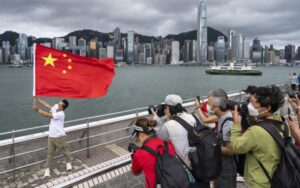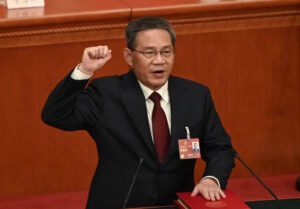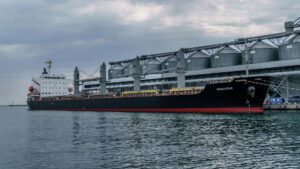
The overwhelming majority of residents of all regions of Ukraine express a negative attitude towards the Russian Federation, according to the results of a sociological survey conducted by the Razumkov Center sociological service.
“Negative attitude is most often expressed towards Russia (94%), Belarus (81%), Iran (73.5%), China (60%), Hungary (46.5%). Negative attitudes towards Russia are expressed by the vast majority of residents of all regions – from 90% of the eastern region to 97% of the central region,” reads the press release on the results of the survey.
The researchers also specify that 95.5% of those who communicate mainly in Ukrainian at home have a negative attitude towards Russia and 88% of those who communicate in Russian.
At the same time, according to the results of the poll, only 2% of respondents express a positive attitude to citizens of the Russian Federation, 77% express a negative attitude and 14% express a neutral attitude.
“Positive attitude to citizens of Russia is expressed by 4% of residents of the eastern and southern regions, 2% of residents of the central region and 0% of residents of the western region. Negative attitude is expressed by 70%, 56.5%, 80% and 84%, respectively. Among those who communicate primarily in Ukrainian at home, a positive attitude towards citizens of Russia is expressed by 0.6%, among those who communicate in Russian – 5%, negative attitude – 82% and 59.5%, respectively,” – indicate the Razumkov Centre.
In addition, the vast majority (97%) of respondents have a negative attitude towards the government and the Russian State Duma.
At the same time, Ukrainians more often express a positive attitude towards Poland (94%), Great Britain (91%), Lithuania (91%), Estonia (90%), Latvia (90%), Canada (90%) and the Czech Republic (88%), The USA (88%), Netherlands (86%), France (86%), Germany (85%), Moldova (82,5%), Slovakia (82,5%), Israel (75%), Japan (74%), Turkey (72,5%), Georgia (70%), Romania (69%), Armenia (66%), Azerbaijan (65%). The relative majority (46%) have a positive attitude towards India.
The sociological service of the Razumkov Center conducted a sociological survey “Orientations of Ukrainian citizens in foreign policy, assessments of government foreign policy and attitudes toward foreign states and politicians” on February 22 – March 1, 2023, in the framework of MATRA program, financed by the Embassy of the Kingdom of the Netherlands in Ukraine.
The face-to-face survey was conducted in all regions of Ukraine, except for the temporarily occupied territories of Donetsk, Zaporizhzhia, Luhansk, Kharkiv and Kherson regions, Crimea and territories where hostilities are taking place.
Representatives of the Razumkov Center’s social service interviewed 2020 respondents aged 18 years and older. The theoretical sampling error does not exceed 2.3%. At the same time, additional systematic sampling deviations may be due to the consequences of the Russian aggression, in particular, the forced evacuation of millions of citizens.

China resumes issuing tourist visas to foreign nationals from March 15, the consular service of China’s Ministry of Foreign Affairs said.
“Chinese consulates abroad will resume issuing all categories of visas to foreigners starting Wednesday, March 15. The decision was made to further facilitate border crossings,” said a message posted Tuesday on WeChat.
In addition to resuming new visas, entry will be allowed for visas issued before March 28, 2020, that have not expired.
“The new visa policy will also allow the resumption of visa-free travel for tourists to Hainan Island, passengers arriving on cruise ships to Shanghai, and tourist groups from Hong Kong, Macau and ASEAN (Association of Southeast Asian Nations) countries to the country’s southern regions,” the statement said.
On the sites of Chinese embassies of some countries, including the U.S. and France, there were reports on the resumption of visas for foreign nationals.
China lifted entry and exit restrictions imposed because of the coronavirus pandemic as of Feb. 6.
China welcomed 65.7 million foreign tourists in 2019.

Foreign Minister Dmytro Kuleba said on Monday that he has submitted to Ukrainian President Volodymyr Zelensky nominations for Ukraine’s ambassadors to China, India and Brazil.
Kuleba said on Facebook that the Foreign Ministry has created an open search for Ukraine’s ambassadors, and the vacancy is currently open for 21 countries except China, India and Brazil.
“As a final note: you may note that China, India and Brazil are not among the list of countries. And you would be right. This is because I have already submitted to the President of Ukraine candidates for ambassadors to these countries. You will know their names after the publication of the corresponding decrees. I will only say that we plan to send to such special countries specialists in state work experience at the level of ministers and deputy ministers”, – Kuleba wrote.

The session of the National People’s Congress (NPC) elected Li Qiang as the new Premier of the State Council of China.
He was nominated by Chinese President Xi Jinping, who was re-elected for a third term the day before.
Li Qiang, born in 1959, was head of the Shanghai Municipal Committee of the CPC from 2017-2022. From 2016-2017, he was head of the CPC Party Committee of Jiangsu Province, and from 2012-2016. – Governor of Zhejiang Province.
He succeeded Li Keqiang, who had led the Chinese government since 2013, as head of the cabinet.
The plenary session also elected deputy chairmen of China’s Central Military Council. They were Generals Zhang Yuxia and He Weidong.
Liu Jingguo will head the State Supervision Committee of the PRC, Zhang Jun was elected chairman of the Supreme People’s Supreme Court of the PRC, and Ying Yong was elected chairman of the Supreme People’s Procuratorate.
At a plenary session on Sunday, deputies elected deputy prime ministers of the State Council of the PRC and the new composition of the cabinet.

China will invest 12.9 billion yuan ($1.9 billion) in the country’s largest memory chip maker Yangtze Memory Technologies Co. (YMTC).
The funds will be provided to the company through The National Integrated Circuit Industry Investment Fund Ltd. investment fund, according to a government website.
It could mark a resumption of state capital flows into the industry, which is subject to U.S. sanctions, Bloomberg said.
Representatives of YMTC and the fund did not respond to the agency’s inquiries.
The Wuhan-based company is China’s largest maker of 3D NAND flash memory chips used in smartphones and other electronic devices. Last year, YMTC, along with more than 30 other Chinese companies, was blacklisted by U.S. authorities. U.S. technology companies cannot supply components to Chinese organizations on this list without obtaining a special export license from the U.S. Department of Commerce.

Four dry-cargo ships with more than 250,000 tons of food left Ukrainian ports on Wednesday, the Joint Coordination Center (JCC) reports.
According to JCC the Laskaro S vessel will deliver 62 088 tons of corn to Belgium, the Astra Perseus dry-cargo carrier will carry 55 thousand tons of corn to Spain. Vessel Geneve is going to Turkey with 32 thousand tons of wheat and 33 thousand tons of barley. Andonis dry-cargo carrier set a course for China, carrying 48 502 tons of corn and 18.7 thousand tons of sunflower meal.
It is noted that four more dry-cargo ships are heading for the ports of Ukraine.
“The total tonnage of grain and other agricultural products exported from the three Ukrainian ports is 22,747,287 tons. The total number of agreed ship movements is 1,543,” the report said.
SKC reported that “100 applications for participation in the initiative have been submitted.”